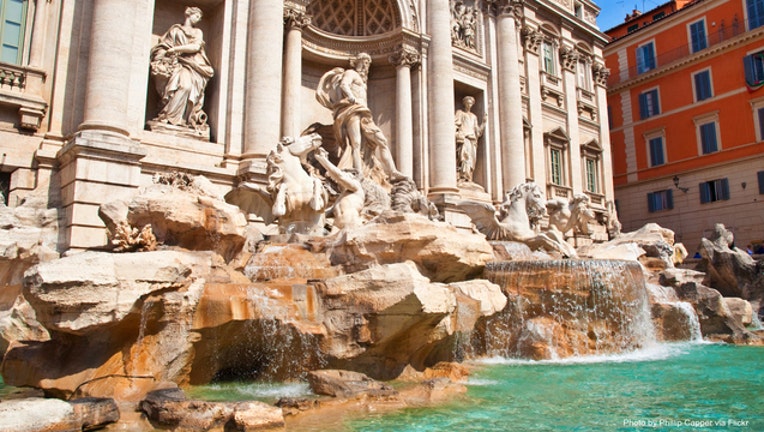Residents of Italy could face drastic water rationing this week; fountains in Rome may be shut off

Stock photo of Trevi Fountain in Rome courtesy Phillip Capper via Flickr
ROME (AP) -- Scarce rain and chronically leaky aqueducts have combined this summer to hurt farmers in much of Italy and put Romans at risk for drastic water rationing as soon as this week.
Sky TG24 TV meteorologists noted on Sunday that Italy had experienced one of its driest springs in some 60 years and that some parts of the country had seen rainfall totals 80 percent below normal. Among the hardest-hit regions was Sardinia, which is seeking natural disaster status.
Farmers' lobby Coldiretti last week estimated 2 billion euros ($2.3 billion) worth of damage so far to Italian agriculture. Dairy farmers are lamenting drops in milk production. Among those suffering are farmers growing canning tomatoes in the southeastern region of Puglia, wine grapes throughout much of Italy and those cultivating olives -- all signature crops for the nation.
Another afflicted area was the province in Parma, an area in north-central Italy renowned for Parmigiano Reggiano cheese and prized prosciutto.
Rome's water supply worries have turned political. Last week, the governor of Lazio region, which includes the Italian capital, ordered no more water drawn from Lake Bracciano, which supplies some of the Italian capital, because the drastically decreasing water level posed danger to the aquatic life of the lake, some 40 kilometers (25 miles) from the city.
The lake used to be used only for backup water supply but recent years have seen it being tapped on a regular basis.
Rome water company ACEA warned that with the lake eliminated for water supplies, drastic rationing loomed. Italian media said staggered water supply shutdowns could last as long as eight hours daily in alternating neighborhoods and start as soon as Wednesday. Rome's famed fountains risk being turned off.
Since the city of Rome is a major shareholder in Acea, populist 5-Star Movement Mayor Virginia Raggi was feeling some heat. Michele Meta, a Democratic party lawmaker from Rome, demanded to know why Acea "doesn't have other solutions besides rationing and staggering the capital's water" supply?
Mother Nature was blamed in good part. Rome had 26 rainy days in this year's first six months, compared to 88 in the first half of 2016, with precipitation totals in those same periods more than four times higher last year than this year.
But water supply pipelines in the Rome area -- famed in ancient Roman times for its aqueducts, segments of which still stand -- are notoriously leaky.
La Stampa daily reported on Sunday that water, energy and environment companies lobby Utilitalia analyzed companies serving roughly half of Italy's population and concluded that the water loss rate from inadequate infrastructure, often decades-old, ranged from 26 percent in the north to 46 percent in the central and southern parts of the country.

